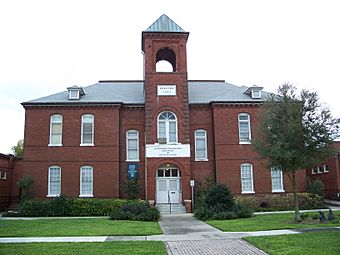Sanford Grammar School facts for kids
Quick facts for kids |
|
|
Sanford Grammar School
|
|
 |
|
| Location | 301 West 7th Street, Sanford, Florida United States |
|---|---|
| Built | 1902 |
| Architect | Wilbur Talley |
| Architectural style | Romanesque Revival |
| NRHP reference No. | 84000253 |
| Added to NRHP | November 23, 1984 |
The Sanford Grammar School is a very old and important school building in Sanford, Florida. It is also known as the Sanford High School or the Margaret K. Reynolds Building. This historic building is located at 301 West 7th Street. It was built a long time ago, in 1902. A famous architect named Wilbur B. Talley designed it. He used a special style called Romanesque Revival. Later, in 1916, another architect, Elton James Moughton, added new parts to the building.
Because of its history and unique design, the Sanford Grammar School was added to the U.S. National Register of Historic Places on November 23, 1984. This means it is a special place that is protected for future generations.
Contents
Sanford Student Museum and Public History Center
What is the Museum?
Today, the historic Sanford Grammar School building is home to the Sanford Student Museum and Public History Center. This museum is a special place where students and the public can learn about history. It is run by a team-up between the Seminole County Public Schools and The University of Central Florida.
What Can You See There?
The museum has many interesting things to see. You can explore exhibits about geography and learn about different places. There are displays about Native Americans and how they lived long ago. You can also discover what pioneer life was like in early Florida.
The museum also shows how education used to be in the past. There are exhibits about the local African-American neighborhood called Georgetown. You can see antique household items and old dolls. All these exhibits help tell the story of local history in Sanford.
Visiting the Museum
The Sanford Student Museum is mainly set up for school groups. They have special programs for students to visit and learn. However, the museum is also open to the public on certain afternoons each week. It's a great place to visit if you want to learn more about Sanford's past!
 | Leon Lynch |
 | Milton P. Webster |
 | Ferdinand Smith |



